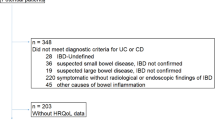Abstract
Introduction
In order to facilitate our understanding of health-related quality of life (HRQoL) for inflammatory bowel disease (IBD) patients, it is critical to explore their subjective experiences with the disease. Research has suggested that current modes of assessing HRQoL (i.e., generic and disease-specific measures) may not fully represent all dimensions of patients’ HRQoL. The purpose of this study was to examine IBD patients’ subjective experiences of the daily impact of IBD, and categorize dimensions of their HRQoL affected by IBD, as identified by the patients themselves.
Methods
Two hundred and eighty-two patients with IBD provided answers to the qualitative question “How has IBD affected your daily activities?” A content analysis using NVivo 2.0 was conducted on the participants’ responses to this question to reveal dimensions of their HRQoL.
Results
The analysis yielded six dimensions and several subdimensions of HRQoL, including physical (systemic functioning, daily functioning, energy/vitality, pain), emotional, social, cognitive (functioning, attending to disease), self-regulation (taking control, loss of control, and neutral), and practical functioning.
Discussion
These results reflect previous findings, but also reveal several dimensions of HRQoL not included in current measures of HRQoL for IBD patients (i.e., cognitive, self-regulation, and practical). The implications of these findings for future measurement of HRQoL and research with IBD patients are discussed.
Similar content being viewed by others
References
Hall, N. J., Rubin, G. P., Dougall, A., Hungin, A. P. S., & Neeley, J. (2005). The fight for ‘health-related normality’: A qualitative study of the experiences of individuals living with established inflammatory bowel disease (IBD). Journal of Health Psychology, 10, 443–455. doi:10.1177/1359105305051433.
Mackner, L. M., Sisson, D. P., & Crandall, W. V. (2004). Review: Psychosocial issues in pediatric inflammatory bowel disease. Journal of Pediatric Psychology, 29, 243–257. doi:10.1093/jpepsy/jsh027.
Casati, J., Toner, B. B., De Rooy, E. C., Drossman, D. A., & Maunder, R. G. (2000). Concerns of patients with inflammatory bowel disease: A review of emerging themes. Digestive Diseases and Sciences, 45, 26–31. doi:10.1023/A:1005492806777.
Nightingale, A. (2006). Treatment and management of inflammatory bowel disease: Allison Nightingale discusses diagnosis, treatment management of inflammatory bowel disease and highlights the role of the specialist nurse (disease/disorder review). Primary Health Care, 16, 27–32.
Bassi, A., Dodd, S., Williamson, P., & Bodger, K. (2004). Cost of illness of inflammatory bowel disease in the UK: A single centre retrospective study. Gut, 53, 1471–1478. doi:10.1136/gut.2004.041616.
Moody, G. A., & Mayberry, J. F. (1996). Life insurance and inflammatory bowel disease: Is there discrimination against patients? International Journal of Colorectal Disease, 11, 276–278. doi:10.1007/s003840050061.
Drossman, D. A., Patrick, D. L., Mitchell, C. M., Zagami, E. A., & Appelbaum, M. I. (1989). Health-related quality of life in inflammatory bowel disease. Digestive Diseases and Sciences, 34, 1379–1386. doi:10.1007/BF01538073.
Farmer, R. G., Easley, K. A., & Farmer, J. M. (1992). Quality of life assessment by patients with inflammatory bowel disease. Cleveland Clinic Journal of Medicine, 59, 35–42.
Guyatt, G., Mitchell, A., Irvine, E. J., Singer, J., Williams, N., Goodacre, R., et al. (1989). A new measure of health status for clinical trials in inflammatory bowel disease. Gastroenterology, 96, 804–810.
Smith, G. D., Watson, R., & Palmer, K. R. (2002). Inflammatory bowel disease: Developing a short disease specific scale to measure health related quality of life. International Journal of Nursing Studies, 39, 583–590. doi:10.1016/S0020-7489(01)00042-6.
Sorensen, V. Z., Olsen, B. G., & Binder, V. (1987). Life prospects and quality of life in patients with Crohn’s disease. Gut, 28, 382–385. doi:10.1136/gut.28.4.382.
Casellas, F., Lopez-Vivancos, J., Badia, X., Vilaseca, J., & Malagelada, J.-R. (2001). Influence of inflammatory bowel disease on different dimensions of quality of life. European Journal of Gastroenterology and Hepatology, 13, 567–572. doi:10.1097/00042737-200105000-00017.
Palm, O., Bernklev, T., Moum, B., & Gran, J. T. (2005). Non-inflammatory joint pain in patients with inflammatory bowel disease is prevalent and has a significant impact on health related quality of life. Journal of Rheumatology, 32, 1755–1759.
Naughton, M. J., & Shumaker, S. A. (2003). The case for domains of function in quality of life assessment. Quality of Life Research, 12, 73–80. doi:10.1023/A:1023585707046.
Drummond, M. F. (1987). Resource allocation decisions in health care: A role for quality of life assessments? Journal of Chronic Diseases, 40, 605–616.
Ware, J. E., Jr, & Sherbourne, C. D. (1992). The MOS 36-Item Short-Form Health Survey (SF-36): I. Conceptual framework and item selection. Medical Care, 30, 473–483. doi:10.1097/00005650-199206000-00002.
Coons, S. J., Rao, S., Keininger, D. L., & Hays, R. D. (2000). A comparative review of generic quality-of-life instruments. PharmacoEconomics, 17, 13–35. doi:10.2165/00019053-200017010-00002.
Drossman, D. A. (1999). Psychosocial factors in ulcerative colitis and Crohn’s disease. In: J. B. Kirsner (Ed.), Inflammatory bowel disease (5th ed., pp. 342–357). Philadelphia: W. B. Saunders Company.
Lopez Blanco, B., Moreno-Jimenez, B., Devesa Mugica, J. M., & Rodriguez Munoz, A. (2005). Relationship between socio-demographic and clinical variables, and health-related quality of life in patients with inflammatory bowel disease. Revista Española DE Enfermedades Digestivas, 97, 887–898.
McColl, E., Han, S. W., Barton, J. R., & Welfare, M. R. (2004). A comparison of the discriminatory power of the inflammatory bowel disease questionnaire and the SF-36 in people with ulcerative colitis. Quality of Life Research, 13, 805–811. doi:10.1023/B:QURE.0000021701.28467.57.
Pope, C., Ziebland, S., & Mays, N. (2000). Qualitative research in health care: Analysing qualitative data. British Medical Journal, 320, 114–116. doi:10.1136/bmj.320.7227.114.
Osoba, D., Hsu, M. A., Copley-Merriman, C., Coombs, J., Johnson, F. R., Hauber, B., et al. (2006). Stated preferences of patients with cancer for health-related quality-of-life (HRQOL) domains during treatment. Quality of Life Research, 15, 273–283. doi:10.1007/s11136-005-0580-5.
Patel, M. D., McKevitt, C., Lawrence, E., Rudd, A. G., & Wolfe, C. D. A. (2007). Clinical determinants of long-term quality of life after stroke. Age and Ageing, 36, 316. doi:10.1093/ageing/afm014.
Benito-Leon, J., Morales, J., & Rivera-Navarro, J. (2002). Health related quality of life and its relation to cognitive and emotional function in multiple sclerosis patients. European Journal of Neurology, 9, 497–502. doi:10.1046/j.1468-1331.2002.00450.x.
Salaffi, F., & Stancati, A. (2004). Disability and quality of life of patients with rheumatoid arthritis: assessment and perspectives. Reumatismo, 56, 87–106.
Loonen, H. J., Grootenhuis, M. A., Last, B. F., Koopman, H. M., & Derkx, H. H. F. (2002). Quality of life in paediatric inflammatory bowel disease measured by a generic and a disease-specific questionnaire. Acta Paediatrica, 91, 348–354.
Drossman, D. A., Leserman, J., Li, Z. M., Mitchell, C. M., Zagami, E. A., & Patrick, D. L. (1991). The rating form of IBD patient concerns: A new measure of health status. Psychosomatic Medicine, 53, 6701–6712.
Sirois, F. M., Davis, C. G., & Morgan, M. S. (2006). “Learning to live with what you can’t rise above”: Control beliefs, symptom control, and adjustment to tinnitus. Health Psychology, 25, 119–123. doi:10.1037/0278-6133.25.1.119.
Thompson, S. C., Sobolew-Shubin, A., Galbraith, M. E., Schwankovsky, L., & Cruzen, D., M. (1993). Maintaining perceptions of control: Finding perceived control in low-control circumstances. Journal of Personality and Social Psychology, 64, 293–304. doi:10.1037/0022-3514.64.2.293.
Sirois, F. M., & Wolfe, B. (2007). A continuum of control: Implications for quality of life in patients with inflammatory bowel disease (IBD). International Society for Quality of Life Research Meeting Abstracts. Quality of Life Research supplement, vol. A-81. http://www.isoqol.org/2007mtgabstracts.pdf.
Pennebaker, J. (2007). Editorial: Current issues and new directions in psychology and health: Listening to what people say—the value of narrative and computational linguistics in health psychology. Psychology and Health, 22, 631–635. doi:10.1080/08870440701414920.
Danoff-Burg, S., & Revenson, T. A. (2005). Benefit-finding among patients with rheumatoid arthritis:positive effects on interpersonal relationships. Journal of Behavioral Medicine, 28, 91–103. doi:10.1007/s10865-005-2720-3.
Carver, C. S., & Antoni, M. H. (2004). Finding benefit in breast cancer during the year after diagnosis predicts better adjustment 5 to 8 years after diagnosis. Health Psychology, 23, 595–598. doi:10.1037/0278-6133.23.6.595.
Walker, E. A., Roy-Byrne, P. P., Katon, W. J., Li, L., Amos, D., & Jiranek, G. (1990). Psychiatric illness and irritable bowel syndrome: a comparison with inflammatory bowel disease. American Journal of Psychiatry, 147, 1656–1661.
Bernard, H. R. (2000). Social research methods: Qualitative and quantitative approaches. Thousand Oaks: Sage.
Schaefer, D. R., & Dillman, D. A. (1998). Development of a standard e-mail methodology: Results of an experiment. Public Opinion Quarterly, 62, 378–397. doi:10.1086/297851.
Locke, S. D., & Gilbert, B. O. (1995). Method of psychological assessment, self disclosure, and experiential differences: A study of computer, questionnaire and interview assessment formats. Journal of Social Behavior and Personality, 10, 255–263.
Kiernan, N. E., Kiernan, M., Oyler, M. A., & Gilles, C. (2005). Is a web survey as effective as a mail survey? A field experiment among computer users. American Journal of Evaluation, 26, 245–252. doi:10.1177/1098214005275826.
Joinson, A. N. (2001). Self-disclosure in computer-mediated communication: The role of self-awareness and visual anonymity. European Journal of Social Psychology, 31, 177–192. doi:10.1002/ejsp.36.
Soetikno, R. M., Mrad, R., Pao, V., & Lenert, L. A. (1997). Quality-of-life research on the Internet: feasibility and potential biases in patients with ulcerative colitis. Journal of the American Medical Informatics Association, 4, 426–435.
Loftus, E. V. (2004). Clinical epidemiology of inflammatory bowel disease: Incidence, prevalence, and environmental influences. Gastroenterology, 126, 1504–1517. doi:10.1053/j.gastro.2004.01.063.
Jones, M. P., Bratten, J., & Keefer, L. (2007). Quality of life in patients with inflammatory bowel disease and irritable bowel syndrome differs between subjects recruited from clinic or the internet. American Journal of Gastroenterology, 102, 2232–2237. doi:10.1111/j.1572-0241.2007.01444.x.
Vanderheyden, L. C., Verhoef, M. J., & Hilsden, R. J. (2006). Qualitative research in inflammatory bowel disease: Dispelling the myths of an unknown entity. Digestive and Liver Disease, 38, 60–63. doi:10.1016/j.dld.2005.09.002.
Author information
Authors and Affiliations
Corresponding author
Rights and permissions
About this article
Cite this article
Wolfe, B.J., Sirois, F.M. Beyond standard quality of life measures: the subjective experiences of living with inflammatory bowel disease. Qual Life Res 17, 877–886 (2008). https://doi.org/10.1007/s11136-008-9362-1
Received:
Accepted:
Published:
Issue Date:
DOI: https://doi.org/10.1007/s11136-008-9362-1




